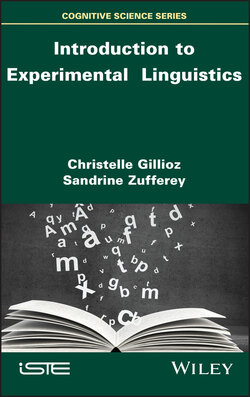Читать книгу Introduction to Experimental Linguistics - Sandrine Zufferey - Страница 5
Оглавление
Preface
This book aims to present the theoretical and methodological principles of experimental linguistics in an accessible manner. It intends to offer an overall vision of the field, so as to help the non-initiated audience to become familiar with the necessary concepts for carrying out linguistic experiments. The elements discussed in this book can particularly serve as a basis for a critical understanding of the results published in the scientific literature and as a starting point for carrying out experiments.
Since the field of experimental linguistics is rich and varied, both in terms of the phenomena studied and of the methods employed, it is impossible to offer an exhaustive presentation. The choice of aspects introduced in this book aims to provide an overview of the different possibilities available to those wishing to carry out an experimental study about language. For every aspect developed in the chapters of the book, there exist specific works which, due to their complexity and the prerequisites they demand, are often reserved for an expert audience. This is why we have deliberately chosen to select the information we deem essential for building a knowledge base that will later enable readers to explore the scientific literature and other works on this topic. Therefore, the emphasis will be placed on understanding the scientific approach and the methodological principles underlying the construction of experiments, and on analyzing the data which results from these experiments. In regards to research methods, we chose to make a presentation of the most accessible methods for linguists. In order to illustrate the many possibilities for applying such methods, we have provided examples drawn from different fields in linguistics. Finally, a list of more specific resources and available tools is provided at the end of each chapter, in order to encourage the interested reader to deepen and put into practice the knowledge acquired in this book.
This book begins with an introductory chapter, offering a general overview of the principles underlying experimental methodology, as well as the key concepts which will be developed in the rest of the chapters.
Chapter 2 goes through the various points the researcher should comply with in order to conduct a valid and reliable experiment, thus making it possible to infer solid conclusions. First, we will define the concepts of validity and reliability and then discuss the notion of variables, as well as present different options for measuring such variables. We will pay special attention to the stages involved in the transformation of the research question into an experimentally testable hypothesis.
Chapters 3–5 are dedicated to the different methods used for studying language production (Chapter 3) and language comprehension, focusing not only on the results of the comprehension process (Chapter 4), but also on the process itself (Chapter 5).
Chapter 6 presents the main practical aspects associated with the construction of an experiment, such as the various possibilities offered by different types of experimental designs, the criteria for choosing the experimental material, the stages involved in an experiment, the aspects related to data collection, as well as the ethical principles that should be observed while carrying out research with human participants.
Finally, Chapter 7 offers an introduction to the analysis of quantitative data, aiming to summarize the key elements for understanding descriptive and inferential statistics, as found in the scientific literature devoted to experimental linguistics. This chapter will also emphasize the peculiarities of the data acquired through linguistic experiments, namely the interdependence of observations. Then, we will introduce mixed linear models that can be used to analyze such types of data.
Christelle GILLIOZ
Sandrine ZUFFEREY
August 2020
